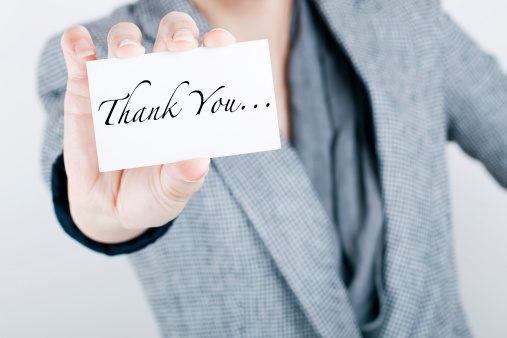Published by Kim Thompson on July 1, 2022
Thanking an interviewer for their time is a common courtesy and most likely will send a good impression if the letter is written well. Most interviewers expect some form of a thank-you letter and tend to mentally check the box when they receive one as a sign of professional protocol.
As much time as it takes to craft a letter, some job candidates wonder if a thank-you letter is necessary for landing a job. The paradox that takes place during the hiring process can be confusing, without showing gratitude you could be considered rude and unappreciative even though a thank-you letter will not guarantee a job offer.
While a thank-you letter may not influence a hiring decision-maker to bring you onboard, without one it sends a negative message that you may not really be interested in the job. Following up with interviewers is part of the job search process and skipping the thank-you message is too risky.
A thank-you letter did impact one job candidate’s career path by keeping him in the mind of the hiring decision-maker. His interview was not that unusual and most job candidates can relate to meeting multiple interviewers before an offer is made. In his case, he was one of two top candidates being considered for a leadership position and he ended coming in as the second choice.
The offer went to the first candidate, but he did something that most take for granted – he sent a thank-you letter and followed it up with a phone call even though he wasn’t selected. In his letter, he mentioned again how much he enjoyed meeting everyone and reiterated his desire to work for the company. He wished the hiring manager much success and hoped to keep communication open.
In less than two months, the first candidate left due to unexpected family issues, and the employer called him immediately. The manager voluntarily told him that his thank-you letter and follow-up made an impact on their decision.
Communicating your appreciation is memorable however consider going a step further and following up with a phone call. Letters, emails, notes can all be forgotten over the long run but when a personal call is made expressing interest it supports your letter and makes you a distinct candidate.
Here are some suggestions for writing a robust thank-you letter:
• Start by expressing your appreciation for their time and interest during the interview.
• Reinstate your overall understanding of the position discussed and the employer’s needs mentioned during the interview.
• Correct any type of misgivings or objections that surfaced during your meeting. This can be a good strategy for minimizing doubt on the part of the interview and strengthening your candidacy.
• End the letter by communicating your interest in working for them and the company.
• Keep it short, be concise and make every word count. You want to keep it around four paragraphs.
• Respond with a thank-you message within 48 hours.
In about a week after you sent the letter, consider following up with a call confirming the interviewer received your note of appreciation. A brief call can add to the rapport made during the interview as well as convey your interest in helping them succeed.
The most important thing to keep in mind is the time it takes to make a good hiring decision. Managers are selecting candidates while keeping up their daily work schedule and somewhere in between the decision to make an offer will surface. When you follow up with a call, it can help refresh a hiring manager’s decision when they are faced with selecting one candidate out of numerous others who could be equally as qualified.
Of course, you need to be keenly aware of how many times you follow up – too much can send a desperate tone. Seeking the right balance in using a thank-you letter and phone call can be an effective search strategy.
What has been your experience with thank-you letters and following up?

